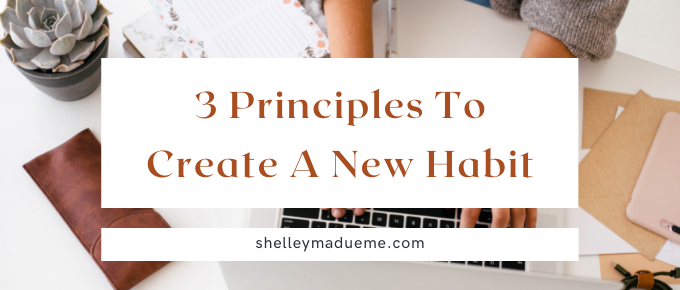The idea that it takes 21-days or 30-days to create a new habit is misleading.
Forming a “bad” habit can actually happen quickly. For example, you hit your afternoon slump and decide to grab a sugary snack. The sugar energizes you enough to get through the next hour or two so you can finish your day.
Then the next time you hit the slump, you remember how good that sugary snack made you feel, so you repeat the cycle. Boom. New habit.
What About Good Habits?
But what about good habits that support our goals? Can you create them in just a few days?
The definitive answer is maybe. If you’re relying solely on motivation to power you through until the magical 21 or 30-day mark, you’ll likely struggle. Fortunately, research indicates that there are a few other factors that can help you achieve success.
These other factors were what helped me develop a daily writing habit, so let’s break them down so you can see how they might apply to the habit you want to create.
I started small
Most people fail with a new habit because it’s hard to stay motivated to do something challenging for more than a few days. BJ Fogg, an authority on habit formation at Stanford, tells people they should start small. Instead of setting a goal to crank out 1000 words every morning, I set my bar for success MUCH lower: 3 sentences.
Now, I realize this goal of writing 3 sentences each day sounds laughable, but it worked. I now write hundreds of words every morning before I start my workday.
Rather than setting the bar too high, it’s much better to remove the pressure and set the bar low.
I paired my habit with something enjoyable
Sticking with difficult habits is, well, difficult. Rather than trying to trick myself into thinking it’s not difficult, I chose to pair it with something enjoyable.
I thought about what would make writing first thing in the morning more enjoyable. I decided a cup of green tea would be perfect. So before I head down to my keyboard, I make myself a cup of tea to drink while I write.
If you can connect your habit to something enjoyable, you’re more likely to stick with it.
I celebrate my success
This point might sound a bit cheesy a first, but I’ve found that I look forward to the celebration I created for the end of my writing period.
Before you dismiss this point, let me point out that the research backs it up. Fogg includes celebration as part of his habit cycle because it works. Celebration can be simple, like smiling at yourself or a first pump.
The main point is to choose something that feels good to you and do it after you complete your habit. I decided to close my eyes and smile and count backward from ten. This helps me transition from writing mode to work mode.
Create a small ritual to celebrate your successes.
My question to you is what habit are you wanting to start, and how can you use these 3 principles to help you succeed?



Leave a Reply